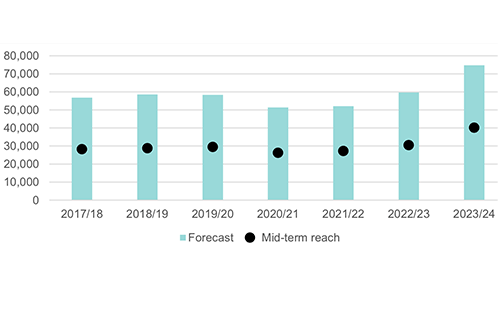The mid-term budget review for the current financial year provides an encouraging framework which in many aspects reflects a government keenly attuned to the nation’s pressing socio-economic needs.
This is the gist of a Simonis Storm (SS) report after the mid-year budget adjustments made on Tuesday by finance minister Iipumbu Shiimi.
In summary, the mid-term review increased the operational budget by N$2.5 billion, while the development budget remains unchanged at N$6.5 billion. Also, an additional N$2.3 billion is allocated to debt servicing and honouring contingent liabilities.
Shiimi said the additional allocations were for items deemed unforeseeable, unavoidable and warranting additional allocations from available resources.
In the report, SS commended the notable allocations toward youth employment and poverty alleviation. This, the stock brokerage stated, signifies a clear focus on the nation’s long-term social capital.
“The mid-term budget review offers an encouraging outlook for Namibia, albeit one that requires nuanced navigation. The landscape is rife with opportunities which can be harnessed through effective policy implementation, strategic collaboration, and sustained commitment to governance reforms. For investors and stakeholders, this presents a landscape that is cautiously optimistic, but ripe with potential. The future holds promise, and with judicious action, that promise can be realised to the benefit of both the economy and society at large,” SS stated.
The firm points out that while there are allocations which may raise eyebrows, it is important to consider broader strategic imperatives that could be at play.
“We anticipate that the success of these allocations, particularly in pivotal sectors like agriculture and tourism, will be significantly augmented by improvements in implementation – a challenge that is not insurmountable, given the right reforms,” the SS report reads. The firm’s report added that while government’s policy directives and the budget itself cast a ray of optimism on the macroeconomic front, it also acknowledged the potential for improvement, specifically relating to public finance and governance structure challenges. “The government has shown a capacity for innovation and adaptability, as evidenced by recent tax reforms and efficiency gains in revenue-collection. Although gaps in public administration and inter-departmental collaboration persist, these are not set in stone, and are subject to improvement with concerted effort,” SS added.
The government’s attention to drought relief is a promising start, although it marks the beginning of a journey rather than its end. They are thus optimistic that the Ministry of Finance and Public Eenterprises will extend its commitment to a more comprehensive, long-term plan to address water security and infrastructural resilience, especially in the central region.
When Shiimi tabled the mid-term budget review this week, he highlighted improved domestic economic activities over the past year and in the near-term in the face of high inflation and elevated global geopolitical tensions. “Nevertheless, we are concerned about the near to medium-term revenue outlook. As a result, we urgently need to further redouble our efforts to mobilise domestic revenues to further enhance fiscal resilience, and we are exploring various options in this regard,” the minister added.
The finance minister emphasised concern about increased public enterprises’ exposure which erodes fiscal space, and crowds out financing for urgent developmental activities. To rectify this, Shiimi has committed to tightening surveillance on public enterprises’ governance, and where necessary, to take actions to safeguard the sustainability of public enterprises. He stated that government has also taken note of fast-rising debt servicing costs, which he warned could further erode fiscal space on much-needed social and economic infrastructure. As such, he has reaffirmed commitment towards stabilising debt growth over the medium-term. Moreover, Shiimi noted that additional expenditure allocations represent the unforeseeable and unavoidable emergency items which were unable to be postponed until the tabling of the next financial year’s main budget. Meanwhile, the nominal budget deficit has been increased marginally by N$579 million, while remaining steady at 4.2% of GDP.


